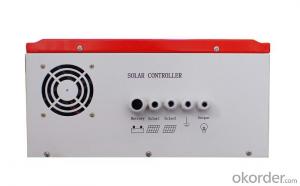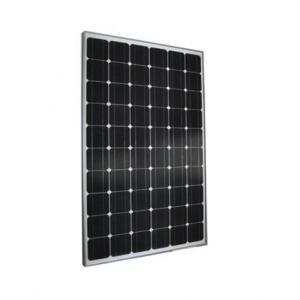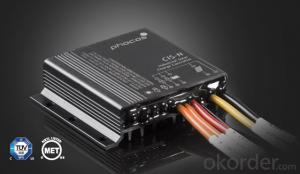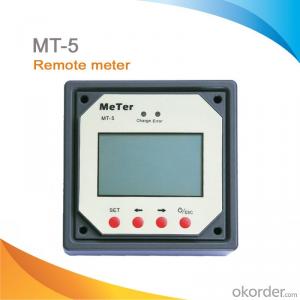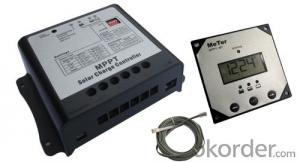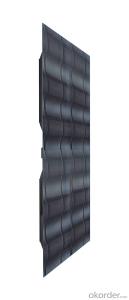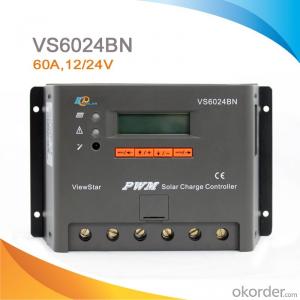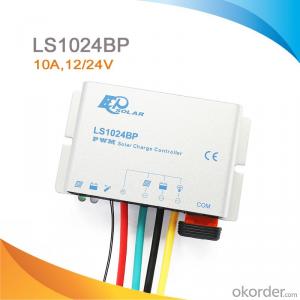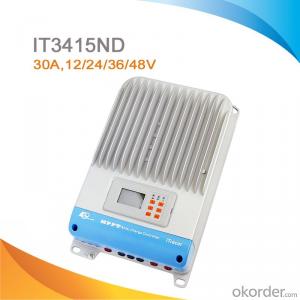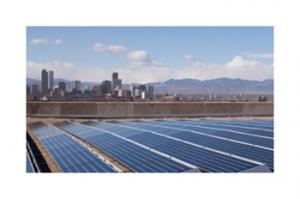MPPT Solar Charge Controller 96V 50A with Best Price for Solar Power System
- Loading Port:
- Qingdao
- Payment Terms:
- TT or LC
- Min Order Qty:
- 1 PCS
- Supply Capability:
- 1000 PCS/month
OKorder Service Pledge
OKorder Financial Service
You Might Also Like
Properties of the solar charge controller
1. Design for off-grid solar power system.
2. Applicable to different kinds of batteries.
3. Adopts MPPT technology (Maximum Power Point Tracking). The advanced tracking algorithm make the solar module operate at ideal voltage which the solar modules can produce the maximum available power.
4. Modular design with simple structure and easy maintenance.
5. Automatic power control function.
Technical parameters of the solar charge controller
Model | 96V50A | |||||
Battery group rated voltage | 96Vdc | |||||
PV Rated current | 50A | |||||
PV open circuit voltage | 400V | |||||
PV Max. power | 4800Wp | |||||
Input PV module road number | 1 | |||||
Function | MPPT charge mode, auto stop charge, auto recharge voltage; Protection: connecting contrary, over current, short circuit, over heat etc. | |||||
Display mode | LCD | |||||
Display content | solar panel voltage, solar panel current, solar panel power, battery voltage, charge current | |||||
MPPT DC voltage range | 80-116Vdc | |||||
Floating Charge Voltage (adjustable) | 110Vdc | |||||
Stop charge voltage | 116Vdc±1% | |||||
Recharge voltage | 108V±1% | |||||
Voltage drop between PV and battery | 1.5V | |||||
Max itself power consumption | 100mA-150mA | |||||
Work environment temperature | -30-60°C | |||||
Relative humidity | 90% No condensation | |||||
Applicable altitude | 3000m The rated power should be reduced when it is higher than 2000m | |||||
Noise (1m) | 40dB | |||||
Degree of protection | IP20(Indoor) | |||||
Cooling method | Forced air cooling | |||||
*Communication interface (optional) | RS485/USB/GPRS/Ethernet | |||||
*Temperature compensation(optional) | -4mv/°C/2V,-35°C~+80°C,Accuracy:±1°C | |||||
Product size (mm) | 480*370*160mm | |||||
Product Weight(kg) | 12kg | |||||
*Above parameter only for reference. Could be custom made to user specifications.
Image
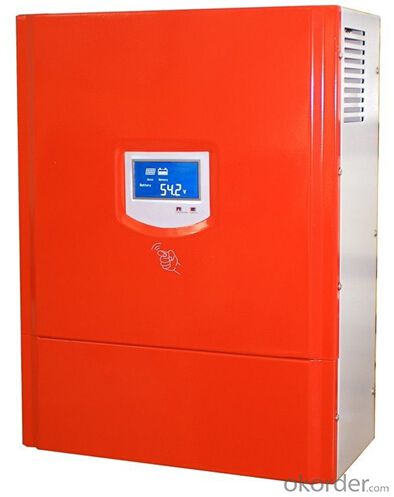
FAQ
Q1:Can we visit your factory?
A1:Sure,welcome at any time,seeing is believing.
Q2:Which payment terms can you accept?
A2:T/T,L/C,Moneygram,Paypal are available for us.
- Q:Can a solar controller be used in a solar-powered space elevator system?
- No, a solar controller cannot be used in a solar-powered space elevator system. A space elevator system requires a complex infrastructure of cables, counterweights, and a climber to transport payloads into space. Solar controllers are designed to regulate and control the flow of power from solar panels to batteries or electrical systems, typically used in applications like solar power generation for homes or vehicles. They are not designed to handle the unique and demanding requirements of a space elevator system.
- Q:How does a solar controller handle fluctuations in solar panel output due to dust or dirt?
- A solar controller handles fluctuations in solar panel output due to dust or dirt by continuously monitoring the panel's performance and adjusting the charging parameters accordingly. It compensates for the reduced efficiency caused by dirt or dust by increasing the charging voltage or current to maintain the optimal charging level. Additionally, some advanced solar controllers also come with built-in cleaning mechanisms or alarms that notify users when the panel requires cleaning, ensuring maximum efficiency and output.
- Q:Can a solar controller be used with a solar-powered wind turbine?
- Yes, a solar controller can be used with a solar-powered wind turbine. A solar controller is designed to regulate and optimize the charging of batteries from solar panels, and it can also be used to regulate the charging of batteries from a solar-powered wind turbine. The solar controller will ensure that the batteries are charged efficiently and protect them from overcharging or discharging, regardless of whether the power source is solar panels or a wind turbine.
- Q:What is the maximum wire size that can be connected to a solar controller?
- The specific model and specifications of the solar controller determine the maximum wire size that can be connected. Typically, solar controllers can handle wire sizes ranging from 10 AWG to 2 AWG. However, it is essential to refer to the manufacturer's instructions or technical documentation for the specific solar controller in use to determine its maximum wire size capacity. Adhering to the manufacturer's guidelines guarantees that the system operates within its intended parameters, ensuring optimal performance and safety.
- Q:How does a solar controller handle the protection against battery reverse polarity?
- A solar controller handles the protection against battery reverse polarity by incorporating a built-in diode or a solid-state switch. This device ensures that the current flows in the correct direction, preventing any damage to the battery caused by reverse polarity.
- Q:Can a solar controller be used with solar panels that are mounted on a pole?
- Solar panels mounted on a pole can indeed be used with a solar controller. The solar controller has a vital function in the regulation of voltage and current between the panels and the battery bank. Its primary purpose is to ensure that the batteries are charged correctly and shielded against overcharging. Irrespective of whether the solar panels are mounted on a pole or any other structure, the solar controller can still be linked to them to supervise and manage the charging process. By analyzing the power received from the panels, the solar controller will adapt the charging parameters, thereby optimizing the efficiency and durability of the battery system.
- Q:Can a solar controller handle different battery types (lead-acid, lithium-ion, etc.)?
- Yes, a solar controller can handle different battery types such as lead-acid, lithium-ion, etc. However, it is important to note that different battery chemistries have specific charging requirements, so the solar controller should be compatible and programmable to cater to the specific needs of each battery type.
- Q:Solar controller water level display is not correct how to do
- If not explain the control board or tube water level sensor bad, consider, for reference!
- Q:Can a solar controller be used with a 120V AC system?
- A 120V AC system cannot be used with a solar controller. The purpose of a solar controller is to regulate and control the electricity flow from solar panels to a battery bank or DC loads. Its operation is based on a DC voltage range, typically between 12V and 48V. Conversely, a 120V AC system operates on alternating current and necessitates a different type of controller, like a charge controller or an inverter, to convert the DC power from solar panels into AC power suitable for use in the system. These controllers are specifically designed to handle the higher voltage and frequency of AC power. Hence, attempting to utilize a solar controller with a 120V AC system would not be compatible and may potentially cause damage to the controller or other components in the system. It is crucial to utilize the appropriate controller that matches the specific voltage and current requirements of the system to ensure safe and efficient operation.
- Q:Can a solar controller be used with solar-powered camping equipment?
- Yes, a solar controller can be used with solar-powered camping equipment. A solar controller helps regulate the charging process of the batteries connected to the solar panels. It ensures that the batteries are charged efficiently and prevents overcharging. Using a solar controller with camping equipment that runs on solar power can enhance the performance and lifespan of the batteries, allowing for a more reliable and sustainable camping experience.
1. Manufacturer Overview |
|
|---|---|
| Location | |
| Year Established | |
| Annual Output Value | |
| Main Markets | |
| Company Certifications | |
2. Manufacturer Certificates |
|
|---|---|
| a) Certification Name | |
| Range | |
| Reference | |
| Validity Period | |
3. Manufacturer Capability |
|
|---|---|
| a)Trade Capacity | |
| Nearest Port | |
| Export Percentage | |
| No.of Employees in Trade Department | |
| Language Spoken: | |
| b)Factory Information | |
| Factory Size: | |
| No. of Production Lines | |
| Contract Manufacturing | |
| Product Price Range | |
Send your message to us
MPPT Solar Charge Controller 96V 50A with Best Price for Solar Power System
- Loading Port:
- Qingdao
- Payment Terms:
- TT or LC
- Min Order Qty:
- 1 PCS
- Supply Capability:
- 1000 PCS/month
OKorder Service Pledge
OKorder Financial Service
Similar products
New products
Hot products
Hot Searches
Related keywords



